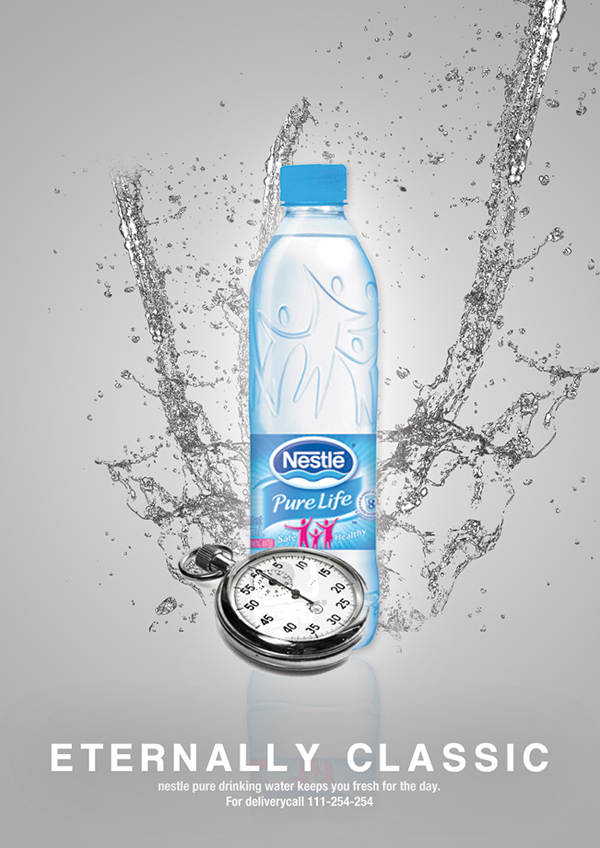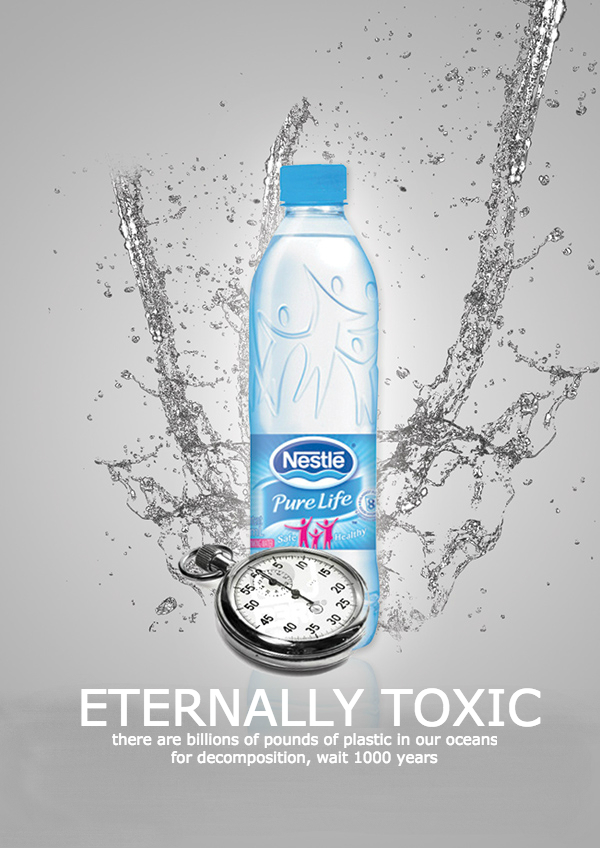Welcome to UBC Blogs. This is your first post. Edit or delete it, then start blogging!
Monthly Archives: June 2017
Culture Jam Assignment – Nestlé

The advertisement reads:
“Eternally Classic”
“Nestle pure drinking water keeps you fresh for the day”
“For delivery call 111-254-254”
This advertisement for Nestlé PureLife is designed to be clean and very simplistic. The aesthetically pleasing splash of water creates a sense of purity and cleanliness. The stopwatch makes the viewer feel as though Nestlé’s product is the key to staying hydrated, staying fresh and even staying young. The ad uses design language of fighting against the clock to target working professionals who work long and exhausting hours. The language of “Eternally Classic” immediately reverberates as a way to not only survive the 9-5 grind, but also suggests infinite vitality and a sense of immortality. Nestlé is suggesting their product can ease the existential fight against time.
The advertisement itself is not explicit in its injustice, however it is the product which creates the real injustice. The entire existence of the privatized bottled water industry is problematic on many social, economic, and environmental levels. The environmental consequences of draining aquifer’s, polluting ground water in the process and resulting in billions of discarded bottles have become disastrous for our planet. The communities which have their water supplies over-drained to advance the interests of shareholders end up with reduced water quality and reduced water supply in case of droughts or other disasters. Nestlé’s CEO has gone so far as to state that public access to drinking water should not be a right and that the worlds water supply should be privatized.
The reality of the injustices committed by Nestlé should provide some insight into the implicit injustice served up by this advertisement. While it presents itself as clean and refreshing, it is selling a product that is destroying the environment and causing significant social and economic problems in the process.

The new ad reads:
“Eternally Toxic”
“There are billions of tons of plastic in our oceans”
“For decomposition, wait 1000 years”
The jammed version of this ad includes the same image but the slogan has been changed to “Eternally Toxic” to represent the toxic nature of the bottled water industry. Single use bottles, while they can take up to 1000 years to fully decompose, begin to release toxic substances into the water long before that. Plastic is currently listed as the number one threat to the world’s marine ecosystem and about 5 billion tons of plastic is being dumped into the oceans every year. This is an issue that Nestlé is directly contributing to by pushing unsustainable single use bottles on customers.
The bottled water industry is not only toxic for the environment, but also for humanity. The UN has voted to recognize access to clean water and sanitation as a basic human right, however the commodification of water continues to fight against this right. Nestlé is pushing for a world in which access to water is dependent on how much a person can afford. Race, class, and gender are influencing how profound the impacts of commodification of water can be. Low income, marginalized groups are being forced to choose between unsanitary conditions or impossibly high prices to access water.
Nestlé is not the only company that is devastating local communities and damaging the global environment. In Fiji, up to 1 million litres of “Fiji Water” is bottled each day for sale in American and global markets. However the local communities there have little access to clean drinking water. It is more than ironic that it is easier for someone in California to purchase a bottle of Fiji Water than it is for a Fijian to access their own water.
Nestlé’s attempt to pass off bottled water as; “Eternally Classic” is infinitely absurd considering the totally unsustainable and catastrophic nature of their product. The clean, classic image they hope to portray is instantly smeared by the dark reality and injustices committed by their company. Thus, the irony of this ad is impossible to deny.